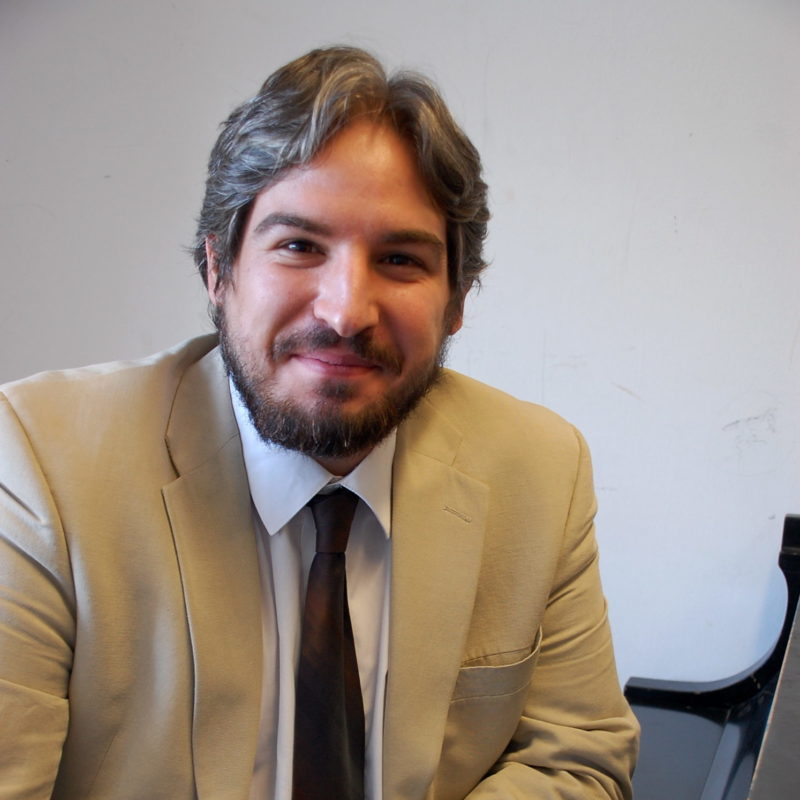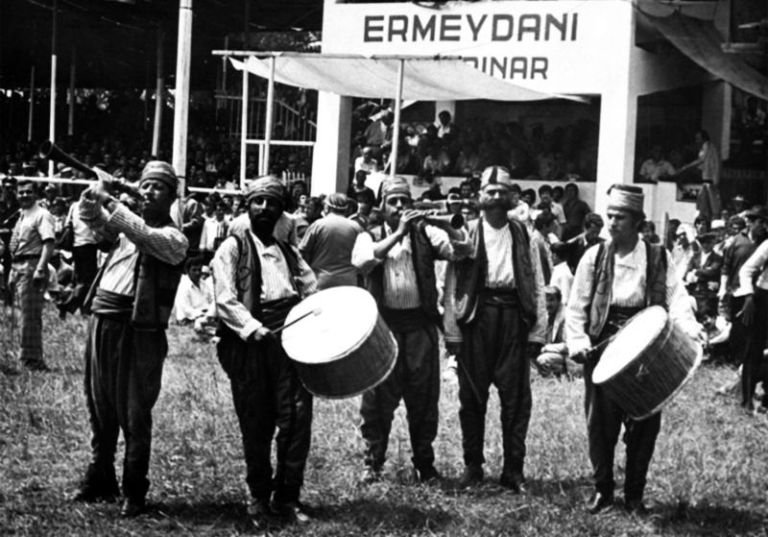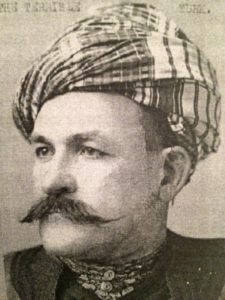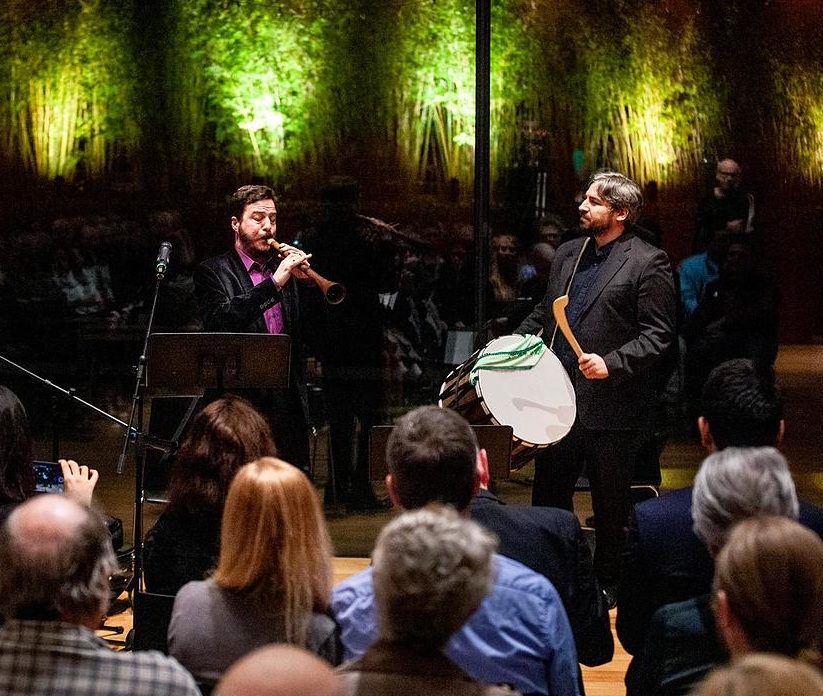
Capping off ROCO’s 14th season of “Games People Play,” our final world premiere commission pays tribute to a game blending skill, strength, and artistic expression – the sport of traditional Turkish wrestling!
For this ROCOInsider, we sat down with composer Erberk Eryılmaz to learn more about the inspiration for his new work – “Wrestling Airs for Two Davuls and Chamber Orchestra (in memory of Koca Yusuf)” – and his unique journey as a musician, taking him cross-continent from his native Turkey, all the way to Texas.
This will be the first orchestral piece you’ve written for ROCO, but your music is not a stranger to our audiences – which works of yours might we have heard before?
Two years ago, ROCO performed my orchestral piece Flying Sirto – which was brought along by violinist and conductor Andrés Cárdenes, when he guested with the orchestra in February 2017. This is a short fun piece, originally written to follow Mozart’s “Turkish” violin concerto (Violin Concerto No. 5). Also – at a ROCO Unchambered concert that season, a set of my Miniatures was performed by violinist Maureen Nelson and percussionist Matt McClung. I am very glad to be returning!
How did this wonderfully creative idea for a commission come about?
After the performance of Flying Sirto, Alecia and I began to chat about the possibility of me writing something for Season 14, in keeping with the theme of “Games People Play.” We considered various ideas, and with my passion for folk music, I came upon the thought to make it about Turkish wrestling – as this music plays an integral role in the event.

Turkish folk musicians with davuls and zurnas
Traditional Turkish wrestling isn’t just wrestling – it’s also high-quality art, involving ceremony, folk poetry, and especially folk music. The announcer for the match, the Cazgır, begins by reading verses to announce each combatant, which are motivational and invitational in spirit – and then the music begins, featuring a number of davuls (double-headed folk bass drums), 10 or 20 of these, and multiple zurnas (double reed folk instruments meant for outdoors). Though a historic sport, it is still today a regular, and significant, part of Turkish culture, with televised matches and many professional athletes.
How is the match musically illustrated in the piece? Any particular themes or elements we should be listening for?
A traditional match includes a natural narrative, with a form of several stages, which helped me musically shape the piece into four movements. The audience will go through the whole experience – from the introductions, to the depiction of the wrestling moves, and finally to the celebration of the winner.
After the first movement kicks off the event, the second movement, Peşrev – gets things going with a ceremonial dance-type music of a long beat pattern, which comes back around in the fourth movement as well.
The third movement, Güreş – is all about the actual match, through music. The audience will see and hear the imitation of a “wrestling game” between the two davul players at the front of the orchestra, and the musicians will be playing a couple of my own authentic instruments from Turkey.
I tried to find a musical way of carrying the real moves of a match through the piece, here. There’s this quiet tension and a feeling of slow-motion as the wrestlers join, as each tries to find a weakness in their opponent, and then sudden movements and intensifying action as one gets the upper hand. You’ll hear this action communicated in the music, with waves of crescendo-like gestures coming quicker, leading to a climax, then the end of the match.
The fourth movement, Kırkpınar – honors the location of the yearly tournament, Edirne, and combines elements and themes from of all the previous movements of the piece.
Were there specific challenges you ran into in writing the piece, and in incorporating these special instruments?
Certainly, just thinking about the specific wrestling moves, and how I would translate them through the music in a way that made sense – it’s not possible to exactly translate, but you can approximate.
The biggest challenge though – is that davuls are loud instruments! You don’t see these drums indoors much; they are extremely festive, outdoor instruments. So, balancing the drums with writing for a chamber orchestra, while staying true to the spirit of the folk music, was a concern.
Folk bands generally have a similar texture and energy throughout a match, but I wanted the piece to express a range of moods and emotion, so the question was – how do I keep that constant current of energy still flowing, while making it less tiring for the musicians, and for the ear.

Yusuf Ismail: known as Koca Yusuf
The piece honors the memory of the famous 19th-century wrestler Koca (”The Great”) Yusuf – tell us more about who he was and his significance?
He first made a name for himself as a wrestler across Europe, known as the “Terrible Turk,” then became internationally famous – really the first Turkish wrestler to become known in the States and travel here to compete, at the time being previously unbeaten.
He had an infamous match in 1898 at the Metropolitan Opera House, where he threw his opponent out of the ring and instigated a riot – sadly that was the last wrestling game that the Metropolitan Opera House witnessed! After this incident, he decided to return to his homeland, however, he tragically died just a few years later in a boating accident.
What have you most enjoyed about working with ROCO on this commission?
With ROCO, it’s a true collaboration. I have gotten to know the musicians here, I personally know who I’m writing for – which is such a source of inspiration for a composer. I love how ROCO approaches and actively promotes new music, with the programming being led by commissions – really making contemporary music relevant to society.
Going back in time – how did you get into studying music, and composition? Where did you grow up?
I was just 3 ½ years old when I began to play piano and soon sung in choir too. I started to compose short pieces for fun, for piano and choir, at about age 8 or 9.
I grew up in Samsun, Turkey, then at 10, I was accepted to the Ankara State Conservatory, where I studied both composition and piano. This was already full-time music school, at the same age as students might be in middle school here – and in composition, we were already studying things like symphonies by Roy Harris! Which is something music students might not do until college here.
The composition teacher there, Serdar Mukhatov, was wonderful in spending time with his students – officially we were supposed to have two lessons a week, but we would come at about 1:30 pm and often not leave until 6 or 7 pm, with the students watching each other’s lessons.
I was then already incredibly passionate about studying music – and by age 13, I had developed a real interest in folk music, and involving that in my own compositions. Even the pop songs I liked, all had a strong folk music influence.
Amazingly though, I’ve studied more folk music in the States, than I ever did in Turkey! At conservatory, in a ten-year program – we only ever had two semesters of Turkish music study.
Where did you study here in the States, after conservatory?
I came to the United States for my Bachelor’s degree in composition and piano, at the Hartt School of Music at the University of Hartford, where I studied with composers Stephen Gryc and Robert Carl. I got to experience so much contemporary music there – we had composers visit such as John Corigiliano and Joan Tower, who we were able to study with.
During my time there I wrote my first orchestral work, which was later performed by the Presidential Symphony Orchestra of Turkey. I also had a chance to begin my own ensemble, founding the Hartford Independent Chamber Orchestra, with the goal to perform lesser-known works and new music. I conducted them for six years and wrote several works for them as well. I believe strongly in the performance side of being a musician, and find it really benefits my composing – it helps how I organize the form and phrasing when I write.
After the Hartt School, I attended Carnegie Mellon University for my Masters degree in composition – mainly because I wanted to study with Iranian composer Reza Vali, whose music I had heard with the Hartford Symphony, and it made such an impact. The way he incorporates folk music into his writing was such an inspiration for me, in what I wanted to do in my own writing.
How did you happen to come to Houston?
Several years ago I entered the Apollo Chamber Players International Composition Commissioning Contest and was chosen, bringing me down for my first visit. I loved Houston – the people, the weather – and I also got to meet some of the composition faculty at Rice University, which led me to apply for their doctoral program. The Rice curriculum really appealed to me as it’s smartly designed, to truly prepare us to teach other young composers at a college-level. We observe and study with several composers as part of the program, such as Pierre Jalbert, Richard Lavenda, Arthur Gottschalk, and it’s great to learn from their different styles of teaching.
Houston is so diverse – where can we explore and experience a bit of Turkish culture here?
When it comes to food, Istanbul Turkish Grill is a great place to start! Houston has a vibrant Turkish community, and the very active American Turkish Association – Houston presents a yearly Turkish Festival filled with wonderful music, dance, food and cultural activities.

Performing at the Houston Turkish Music Festival
Also, my wife, violist Laura Krentzman, and I created the Hoppa Project, which aims to promote music from Eastern Europe and the Middle East, and we have started an annual Houston Turkish Music Festival, now in its second year. Our goal is to expose people to a culture they might not be as familiar with, and also to bring foreigners abroad a taste of home through music.
Hoppa is an exclamation commonly used in the region to say “Come on!, Let’s go!” This is the spirit we feel is needed to share what we love.
What’s so great about Houston is its diversity and openness, allowing a project like this to flourish. By being able to express what I love about Turkish culture through my music, and through our efforts with the Hoppa Project, I hope to make my own contribution to the rich cultural fabric of our city.
Hear the world premiere of Wrestling Airs for Two Davuls and Chamber Orchestra by Erberk Eryılmaz – in ROCO In Concert: The Wrestler, Saturday, May 4, 2019, 5:00 pm, at The Church of St. John the Divine. Tickets available at roco.org, or at the door.

Leave A Reply